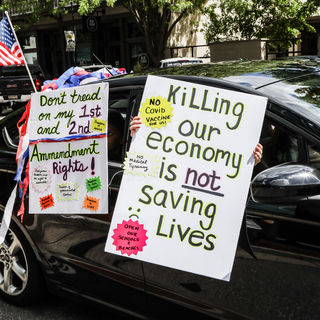Coronavirus Disease 2019
Covid-19, and Our Tribal Identities
When Our Moral Psychology Turns on Itself
Posted April 27, 2020

The deadly COVID-19 virus continues to spread. While a global army of scientists works frantically to develop a vaccine, frontline medical workers risk their lives treating the sick, and epidemiologists race to flatten the pathogen’s exponential growth curve. In all these endeavors physical distancing is crucial. Accordingly, business owners have shut their doors, and the global citizenry has born the emotional weight of social isolation, among so many other economic, psychological, and ultimate sacrifices—scores medical personnel who contracted COVID-19 in the line of duty have already died. Overall, our battle against coronavirus reflects that remarkable human ability to close ranks for a common cause, and indeed may constitute the single largest cooperative effort in our species’ history. Yet, amid so many cooperators, saboteurs are shredding this essential, life-saving social contract to stay away. Nowhere is this disregard for public health so flagrant as in the U.S., which has produced the world’s largest number of coronavirus cases.
As examples, golf courses around the nation were allowed to remain open, along with beaches in Florida. Texas Republican Governor Greg Abbot decreed that religious services are allowable, despite the obvious risks (churches were already defying previous restrictions). With emboldening tweets from Donald Trump, anti-lockdown rallies have proliferated, touting the pandemic as a liberal media conspiracy, and containment efforts as anti-freedom—one protestor’s sign read “Social Distancing is Communism!,” another, “Liberate America!”. Notably, these are gatherings of potentially infectious people in close contact with one another, and perhaps unsurprisingly the virus has begun to kill protestors. While the common thread of churches, Trump, Texas governance, and even golf courses may be political conservatism, how do we make sense of this dangerously irrational behavior?
It is ironic that our sensible, science-based efforts to remove ourselves from corona’s onslaught push against ancient instincts designed to help us survive infectious disease. In other words, our pathogen-survival instincts may have outlived their utility, and today may be helping to actually spread COVID-19 rather than contain it. It may be surprising to learn that these very instincts drive our political behaviors. Given that our strategic responses to infectious disease are utterly dependent on political processes, understanding our evolved responses to germs is now literally a matter of life and death. To ensure our future, we may start with a look to our past.
Our hunter-gatherer ancestors knew nothing about what diseases really were. The microbiologic world was invisible to them. They had no vaccines. They had no antibiotics. But they were (as we are now) equipped with what is known in the evolutionary sciences as a behavioral immune system—a set of emotional responses such as disgust, fear, and hostility that helped them withdraw from potential pathogens. Given that humans were the biggest vectors of disease, that immune system included a prejudicial psychology against outsiders; strangers potentially carried pathogens for which the tribe had no immunity. We already know the devastating impact that contact between distal peoples has had on human populations—that is, before the advent of vaccines, and an understanding of physical distancing. As one crushing example, diseases brought by the European invasion of the “New World” sent up to 90% of Native Americans to their graves.1
Fear of germs, like so many other traits, falls on the natural curve. Just as there were advantages to xenophobia in our ancestral environments, there were advantages to xenophilia (an attraction to outsiders), which afforded our ancestors greater access to new technologies, and mates outside their gene pool. One of the most robust findings in the science of our political psychology is that those who are more germ-and-xenophobic tend to be more politically conservative. It makes sense, then, that today those with greater xenophobia would be drawn to politics that are hawkish in their foreign policy, take tough stances on border security, and posture against affirmative action (which helps people who may be seen as outsiders).
Interestingly, those on the conservative end (on average) tend to be not only more fearful of germs and outsiders, but to be generally more fearful. Imaging studies even find conservatives tend to have larger amygdalae, a brain structure that generates our fear responses.2 Yet, those protesting on the streets, violating isolation orders, putting not only others but also themselves in mortal danger, tend to be overwhelmingly far right. The explanation to this stunning contradiction—tribalism.
The counterpart to turning away from outsiders is turning inward to the tribe. Since we were hunter gatherers, the need for tribal belonging was critical. Not only did we have to turn inward to avoid outsiders’ pathogens, but life outside the circle as relatively weak, slow, naked apes was tenuous; fearsome predators (not to mention hostile outside tribes) were perpetually crouched in wait to remove us from the gene pool. In short, being rejected from the tribe would have been a death sentence. Adding to this threat, as convincingly argued by Richard Wrangham in his book The Goodness Paradox, non-cooperators, or simply those violating social norms, were often executed by the tribe. These pressures drove our tendency to display signals of commitment to our peers.
Sometimes the signals are visual. Think of aboriginal tribes that wear similar regalia to signify belonging—similar headdresses, similar colors, or even tribal scarring or tattoos. Today’s maga-hats, protest signs, political bumper stickers, and T-shirts, tell other members of the group that you’re with them. At other times the signal is showing agreement, and an alarming degree of this kind of conformity happens below the level of conscious awareness. There is important research on this tendency worth pondering.
In the aftermath of WWII, when the world was freshly struggling to understand how ordinary people were influenced to carry out the horrors of the Holocaust, social psychologist Soloman Asch began his classic study on conformity.3 The study was simple. Subjects were shown two cards. One card had one black line. The other, three—one line obviously the same length as the line on the first card, two obviously different. The subjects’ task was to match the line on the first card according to the length of one of the three on the other card. Easy. But Asch then sat eight men in the circle. The first seven were confederates (researchers posing as subjects in this case) instructed to guess the wrong line. This put the real subject in the position of having to go against group consensus. A whopping 32% rated incorrectly. When interviewed, “independent” subjects made confessions like, “I do not deny that at times I had the feeling to “go with it, I’ll go with it, along with the rest” whereas conforming subjects admitted, “I suspected about the middle [line] but tried to push it out of my mind”.
Indeed, that tendency to mentally suppress information that runs contrary to group consensus appears to be related to the fact that humans are exquisitely talented at detecting liars, cheaters, or even insincerity. And so, the capacity to self-deceive may have developed to conceal our true beliefs. Indeed, if Wrangham is right, this ability to self-deceive may have kept our ancestors from getting murdered by their peers.
Today this primal urgency to conform gets expressed in politics. Accordingly, when researchers present subjects with scenarios depicting political candidates contradicting themselves—no surprise, highly partisan Democrats or Republicans are more likely to agree that the rival candidate self-contradicted, and that their own did not. But when researchers observe people engaging in these biases in an MRI machine, the parts of the brain associated with processing pain, fear, punishment and threat appraisal light up.4 The takeaway—the act of accepting your tribe’s contradictory stance is riddled with primal emotions connoting threat. And, once again, this threat drives our biases deeply below the radar of our consciousness.
One revealing study examined how highly partisan liberals and conservatives respond to fabricated newspaper stories on welfare programs.5 One program was exorbitantly generous, the other inflexibly stingy. The researchers then queried which program subjects supported. Given what everyone already knows about our political stances, you might guess which side supported which policy. However, before subjects rated their support, they were told that House Democrats (or Republicans) strongly endorsed each of the two welfare policies, and that the rival partly strongly rejected them. If conservatives believed their party supported the lavish welfare policy, they too supported it, and vice-versa for liberals. This shows us that the impulse to go with the tribe can override our own strongly held principles. Tellingly, subjects reported that their own policy perspectives influenced them most, and that the stances of lawmakers least, despite going with the flow in a way that so blatantly contradicted their own values. In other words, they were blind to their own tribalistic blinders. And therein lies the problem.
Resisting stay at home orders is not simply a matter of ignorance. It’s not that the extreme right lacks access to the basic science about the spread of disease. In fact, we are all bombarded with information on this subject, and even the tightest information bubble has its holes. It’s that accurate information gets deflected by the Teflon coating of our tribal psychology, and for protestors infecting each other during a deadly pandemic (and innocent bystanders at the grocery stores where they shop), rejecting stay at home orders has become a badge of tribal commitment. When protestors see each other in their tribal regalia, when they chant in unison, they feel an ancient, emotionally intuitive sense of belonging. And that they’ve identified an outside force (represented by the liberal media, science, etc.) it draws their emotional ties to each other even tighter. Moreover, by cohering to the preposterous idea that the need for physical distancing is a liberal conspiracy, they reaffirm each other of their commitment to the tribe. But this puts everyone, including themselves, at grave risk. It’s antisocial. It’s dangerous. It’s asinine. But it is explainable. We are social animals operating in groups inclined to show commitment to one another through agreement. What we agree on can be like a virus itself. And critical thinking gets swallowed up by our ancients fears of rejection.
Correcting these dangerous evolutionary mismatches is no small order. And we may never correct them fully. But the single biggest inoculation may be to ensure that critical thinking skills, including a study of our evolved psychology, are a mandatory part of public education. This may prove difficult. There are powerful, monied interests already using our evolved psychology to manipulate us for their own purposes, and they have a stake in keeping us ignorant.
As one example, in 2018 there was a migrant caravan ominously marching toward the US-Mexico border, and spectacularly timed to coincide with the US Congressional elections. The closer the elections, the closer it got. Unsurprisingly Fox News was all over this issue, right up until the elections, at which time coverage seemed to just evaporate. Before then Fox aired stories claiming these migrants were bringing disease, possibly even small pox (a disease that has been eradicated since 1980).6 Surely Fox News knows more about the evolved psychology of germ fears than the voters they were trying to influence. Surely politicians running on border security platforms understand how such fears drive the electorate to vote with the tribe. Surely the powerful in any democratic nation manipulate voters to vote in the interests of the powerful.
But the point here is not only that ignorance of our evolved psychology makes us more vulnerable to others who use it to manipulate, or even harm us. It is that such ignorance makes us vulnerable to ourselves. COVID-19 protestors are just one among so many examples. It is time to allow reason and science (the evolutionary sciences in particular) a seat at the table in conversations about who we are, and how we conduct human affairs, including the management of infectious diseases. We neglect doing so at our own peril.
References
1. https://www.livescience.com/worst-epidemics-and-pandemics-in-history.ht…
2. R.Kanai, T. Fielden, C. Firth, & G. Rees, “Political Orientations Are Correlated with Brain Structure in Young A
3. S. E. Asch, “Effects of Group Pressure upon the Modification and Distortion of Judgments,” in Groups, Leadership and Men; Research in Human Relations, ed. H. Guetzkow (Oxford, England: Carnegie Press, 1951).
4. Drew Westen et al., “Neural Bases of Motivated Reasoning: An FMRI Study of Emotional Constraints on Partisan Political Judgment in the 2004 U.S. Presidential Election,” Journal of Cognitive Neuroscience 18, no. 11 (November 2006): 1947–58, https://doi.org/ 10.1162/jocn.2006.18.11.1947.
5. Geoffrey L. Cohen, “Party over Policy: The Dominating Impact of Group Influence on Political Beliefs,” Journal of Personality and Social Psychology 85, no. 5 (November 2003): 808–22, https://doi.org/10.1037/0022-3514.85.5.808.
6. https://www.newsweek.com/fox-news-migrant-caravan-leprosy-1192605




